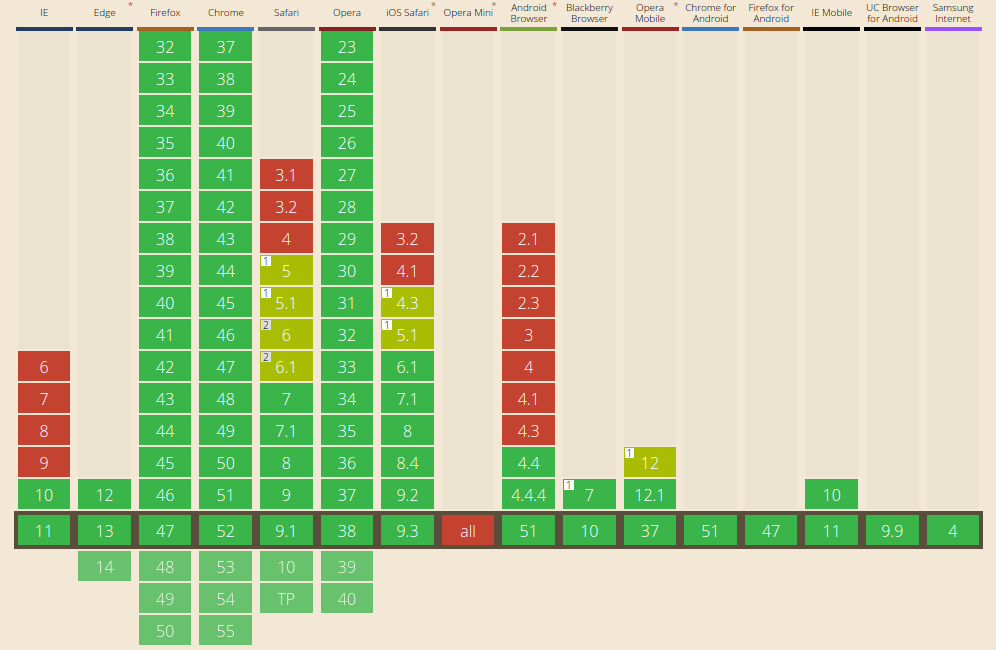Misconceptions
There are few common misconceptions regarding WebSocket and Socket.IO:
The first misconception is that using Socket.IO is significantly easier than using WebSocket which doesn't seem to be the case. See examples below.
The second misconception is that WebSocket is not widely supported in the browsers. See below for more info.
The third misconception is that Socket.IO downgrades the connection as a fallback on older browsers. It actually assumes that the browser is old and starts an AJAX connection to the server, that gets later upgraded on browsers supporting WebSocket, after some traffic is exchanged. See below for details.
My experiment
I wrote an npm module to demonstrate the difference between WebSocket and Socket.IO:
It is a simple example of server-side and client-side code - the client connects to the server using either WebSocket or Socket.IO and the server sends three messages in 1s intervals, which are added to the DOM by the client.
Server-side
Compare the server-side example of using WebSocket and Socket.IO to do the same in an Express.js app:
WebSocket Server
WebSocket server example using Express.js:
var path = require('path');
var app = require('express')();
var ws = require('express-ws')(app);
app.get('/', (req, res) => {
console.error('express connection');
res.sendFile(path.join(__dirname, 'ws.html'));
});
app.ws('/', (s, req) => {
console.error('websocket connection');
for (var t = 0; t < 3; t++)
setTimeout(() => s.send('message from server', ()=>{}), 1000*t);
});
app.listen(3001, () => console.error('listening on http://localhost:3001/'));
console.error('websocket example');
Source: https://github.com/rsp/node-websocket-vs-socket.io/blob/master/ws.js
Socket.IO Server
Socket.IO server example using Express.js:
var path = require('path');
var app = require('express')();
var http = require('http').Server(app);
var io = require('socket.io')(http);
app.get('/', (req, res) => {
console.error('express connection');
res.sendFile(path.join(__dirname, 'si.html'));
});
io.on('connection', s => {
console.error('socket.io connection');
for (var t = 0; t < 3; t++)
setTimeout(() => s.emit('message', 'message from server'), 1000*t);
});
http.listen(3002, () => console.error('listening on http://localhost:3002/'));
console.error('socket.io example');
Source: https://github.com/rsp/node-websocket-vs-socket.io/blob/master/si.js
Client-side
Compare the client-side example of using WebSocket and Socket.IO to do the same in the browser:
WebSocket Client
WebSocket client example using vanilla JavaScript:
var l = document.getElementById('l');
var log = function (m) {
var i = document.createElement('li');
i.innerText = new Date().toISOString()+' '+m;
l.appendChild(i);
}
log('opening websocket connection');
var s = new WebSocket('ws://'+window.location.host+'/');
s.addEventListener('error', function (m) { log("error"); });
s.addEventListener('open', function (m) { log("websocket connection open"); });
s.addEventListener('message', function (m) { log(m.data); });
Source: https://github.com/rsp/node-websocket-vs-socket.io/blob/master/ws.html
Socket.IO Client
Socket.IO client example using vanilla JavaScript:
var l = document.getElementById('l');
var log = function (m) {
var i = document.createElement('li');
i.innerText = new Date().toISOString()+' '+m;
l.appendChild(i);
}
log('opening socket.io connection');
var s = io();
s.on('connect_error', function (m) { log("error"); });
s.on('connect', function (m) { log("socket.io connection open"); });
s.on('message', function (m) { log(m); });
Source: https://github.com/rsp/node-websocket-vs-socket.io/blob/master/si.html
Network traffic
To see the difference in network traffic you can run my test. Here are the results that I got:
WebSocket Results
2 requests, 1.50 KB, 0.05 s
From those 2 requests:
- HTML page itself
- connection upgrade to WebSocket
(The connection upgrade request is visible on the developer tools with a 101 Switching Protocols response.)
Socket.IO Results
6 requests, 181.56 KB, 0.25 s
From those 6 requests:
- the HTML page itself
- Socket.IO's JavaScript (180 kilobytes)
- first long polling AJAX request
- second long polling AJAX request
- third long polling AJAX request
- connection upgrade to WebSocket
Screenshots
WebSocket results that I got on localhost:
![WebSocket results - websocket-vs-socket.io module]()
Socket.IO results that I got on localhost:
![Socket.IO results - websocket-vs-socket.io module]()
Test yourself
Quick start:
# Install:
npm i -g websocket-vs-socket.io
# Run the server:
websocket-vs-socket.io
Open http://localhost:3001/ in your browser, open developer tools with Shift+Ctrl+I, open the Network tab and reload the page with Ctrl+R to see the network traffic for the WebSocket version.
Open http://localhost:3002/ in your browser, open developer tools with Shift+Ctrl+I, open the Network tab and reload the page with Ctrl+R to see the network traffic for the Socket.IO version.
To uninstall:
# Uninstall:
npm rm -g websocket-vs-socket.io
Browser compatibility
As of June 2016 WebSocket works on everything except Opera Mini, including IE higher than 9.
This is the browser compatibility of WebSocket on Can I Use as of June 2016:
![enter image description here]()
See http://caniuse.com/websockets for up-to-date info.



